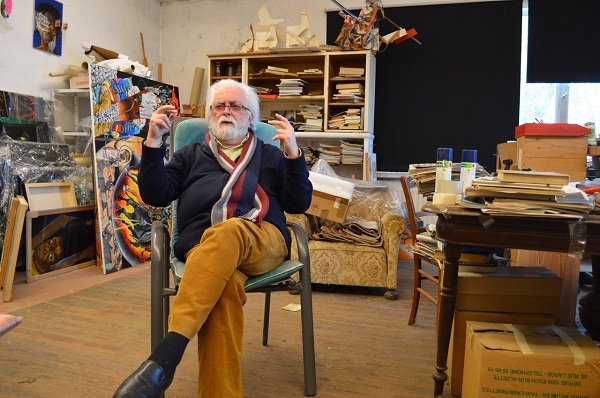 Marc Henri Reckinger;
Credit: TPC
Marc Henri Reckinger;
Credit: TPC
Luxembourg's Ministry of Culture has named Marc Henri Reckinger the winner of this year's Lëtzebuerger Konschtpräis (Luxembourg art prize).
Luxembourg's Minister of Culture, Sam Tanson, congratulated the artist on winning the second edition of the Lëtzebuerger Konschtpräis: "With Marc Henri Reckinger, we honour an artist, a man, a career, a life dedicated to art and social commitment. At all times, it remains important to keep a spirit that is at the same time open, tolerant and critical vis-à-vis the world around us and the challenges brought by a democratic and plural society, and the resolutely contemporary work of this great artist encourages us to reflect, while appearing as a call to action. The work and commitment of Marc Henri Reckinger are essential and contributory elements to social dialogue and also have the merit of having lastingly and clearly promoted the development and evolution of the artistic scene in Luxembourg and beyond."
The jury was composed as follows: Jamie Armstrong, art historian and head of the Lëtzebuerger Konschtarchiv; Christian Mosar, art historian, art critic, exhibition curator and director of the Konschthal; Ruud Priem, head of department and curator of the fine arts collections at the National Museum of Archaeology, History and Art (MNAHA); Edmond Thill, museum educator, former head of the educational service at the MNAHA and secretary of the arts and letters section of the Institut Grand-Ducal; Danièle Wagener, art historian, exhibition curator, director of the 2 Musées de la Ville de Luxembourg and President of the Œuvre nationale de secours Grande-Duchesse Charlotte.
The jury members "unanimously chose" Marc Henri Reckinger (born in 1940), "whose career and work correspond in all respects to the criteria set at the time the prize was created." The jury described the winning artist's work as "one of the rare examples in our country of an art of protest which aims to denounce the excesses of capitalism and the national and international political leaders who represent it."
They added that Marc Henri Reckinger, like the first Lëtzebuerger Konschtpräis winner in 2022 (Berthe Lutgen), forms part of "the generation of artists who were at the origin of a renewal of artistic life in Luxembourg during the 1960s." He was a pupil of Roger Castel, a leading representative of the post-war School of Paris. He "abandoned abstract painting early on to become the initiator and co-founder of the Granges de Consdorf and the Arbeitsgruppe Kunst (later renamed Initiative 69), the two main protest art movements of the late 1960s and early 1970s." The jury also noted that Marc Henri Reckinger was one of the first artists in Luxembourg to exhibit works inspired by pop art, hard-edge and conceptual art.
After a break during which he devoted his time to politics, the artist returned to painting in the late 1970s, "turning first to socialist realism which [...] allows him to create critical works in which he condemns social injustices and policies of repression in the world, then towards cubism, one of the artistic currents which, according to him, has contributed the most to revolutionising the plastic arts in the last century."
Today, Marc Henri Reckinger "continues to take a lucid look at national and international politics, but also at artistic life in Luxembourg."
Endowed with €10,000, this biennial prize recognises an artist for all of his/her work, his/her career and his/her lasting commitment to the Luxembourg artistic scene. Artists active in the field of visual arts, who are of Luxembourg nationality, living/working in Luxembourg or who have a strong cultural anchorage in the artistic scene of the country are eligible for the award.
The award ceremony will take place at the MNAHA in Luxembourg-Ville in October 2024.








